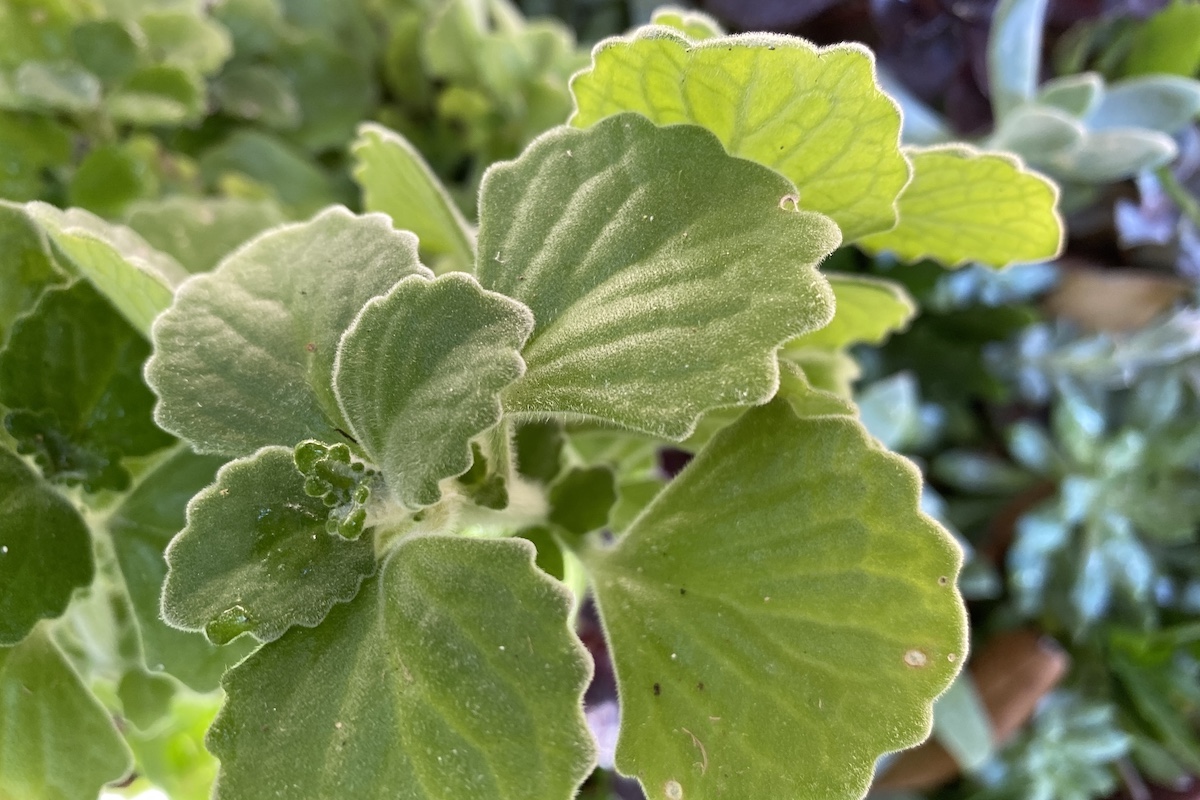If you've been to my garden recently, Mama Debra has slathered "comfort plant" juice on your bug bites, scrapes or---if you brought your dog---hot spots.
I’m informally testing the herbal benefits of Plectranthus amboinicus, a semi-succulent with velvety, juicy leaves.
If you think "stinky" when it comes to Plectranthus, think again. Unlike better-known species, comfort plant doesn't smell like cat urine or Vicks. I actually like its eucalyptus-camphor aroma.

Comfort plant in my garden. Leaves are one to two inches wide.
In the mint family, it's an edible, pleasant-looking addition to the garden. But what's exciting is that this Asian-African perennial's therapeutic benefits may exceed those of Aloe vera.
What Scientists Say
As you know, I'm both journalist and horticulturist. I'm highly skeptical of high-falutin' claims---and you should be too. But after researching comfort plant, I've found that scientists credit it with properties beyond my expectations. Here are two examples (there are others):
According to the scientific journal Molecules (March, 2016), "Botanical, Phytochemical, Pharmacological and Nutritional Significance of Plectranthus amboinicus":
“Studies have cited numerous pharmacological properties including antimicrobial, antiinflammatory, antitumor, wound healing, anti-epileptic, larvicidal, antioxidant and analgesic activities. Also, it has been found to be effective against respiratory, cardiovascular, oral, skin, digestive and urinary diseases. This article allows researchers to further explore the further potential of this multi-utility herb for various biomedical applications."
From the journal of Evidence-Based Complementary and Alternative Medicine, “Analgesic and Antiinflammatory Activies of the Aqueous Extract from Plectranthus amboinicus,” 2012:
"This herb has therapeutic and nutritional properties attributed to its natural phytochemical compounds which are highly valued in the pharmaceutical industry. Besides, it has horticultural properties due to its aromatic nature and essential oil producing capability. It is widely used in folk medicine to treat conditions like cold, asthma, constipation, headache, cough, fever and skin diseases. The leaves of the plant are often eaten raw or used as flavoring agents, or incorporated as ingredients in the preparation of traditional food."
Where To Find It
I first learned about comfort plant when Annie Schreck of Mountain Crest Gardens and I visited Waterwise Botanicals nursery. WWB's Tom Jesch shared his personal experiences with the herb. (Those of you who know Tom know he has health issues---I hope I'm not being indiscreet in mentioning that.)
These two nurseries, both of which I respect highly, are introducing comfort plant to USA markets this month. If you live within driving distance, obtain it at Waterwise Botanicals north of San Diego; if not, online from Mountain Crest Gardens.

NEW VIDEO: "How do you get the juice?" botanical researcher Annie Schreck of Mountain Crest Gardens asks Tom Jesch of Waterwise Botanicals nursery.
Comfort Plant Care
Comfort plant is as easy to grow as mint or, say, scented geraniums. Similar to trailing succulents, it wants:
- good soil
- protection from harsh midday sun, especially in summer
- good air circulation
- regular water
- protection from frost
- fertilizer to encourage lush growth
As you would any plant you might use in tea or salads, don't apply pesticides.
My own comfort plant (thank you, WWB) is in my side-yard nursery where new plants land. I'll soon move it to a hanging pot where stems can trail several feet, leaves are easy to harvest, and it'll be sheltered from cold in winter.
Say, if you were here recently, how's that rash?
LEARN MORE about this new-yet-ancient herb on the...
Related Info
Why You Should Grow Aloe Vera
Why should you—and can you—grow Aloe vera? It’s arguably the most commercially grown succulent (followed by the tequila agave and supermarket kalanchoe). The medicinal and cosmetic value of the plant’s gel-filled leaves have been recognized for millennia, and it is reputed to have been part of Cleopatra’s beauty regimen. Google “Aloe vera” and you’ll get…
The post Comfort Plant Benefits appeared first on Debra Lee Baldwin. Copyright © Debra Lee Baldwin.
from Debra Lee Baldwin https://ift.tt/2W65Sim
via IFTTT


No hay comentarios:
Publicar un comentario